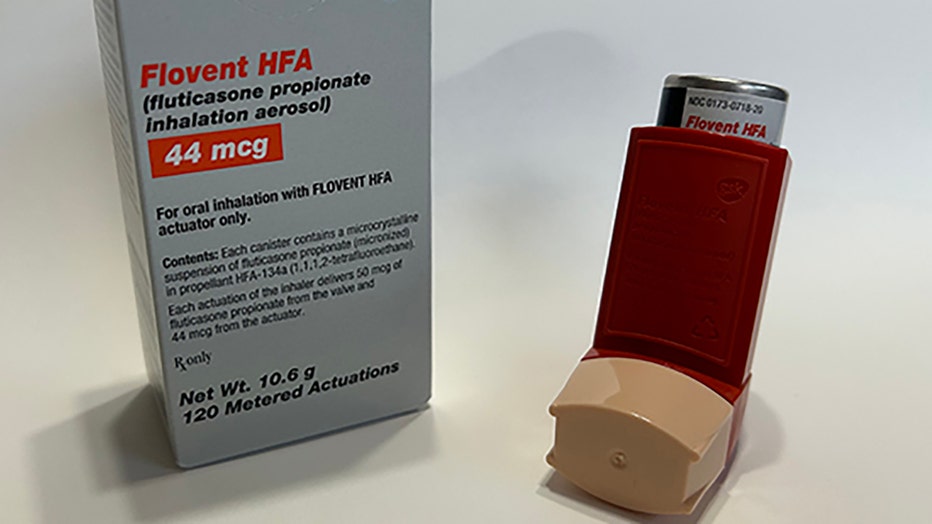Asthma inhaler to be discontinued in January – here's what patients should know
In this photo illustration, two asthma inhalers are pictured in a handbag on Feb. 3, 2021. (Photo by Ute Grabowsky/Photothek via Getty Images)
A popular corticosteroid inhaler used to treat asthma and other conditions is being discontinued, and despite generic versions now available, health experts are warning patients to plan ahead for making the switch and potential issues with insurance coverage.
Manufacturer GSK announced earlier this year that it’s discontinuing all strengths of its branded inhaler Flovent HFA and Flovent Diskus on Dec. 31. The company believes a supply of these products, which are inhaled corticosteroid medicines used as a controller medicine to treat asthma, will be gone by early 2024.
RELATED: CDC urges healthcare providers to increase respiratory vaccine coverage
Flovent HFA is a popular inhaler – including for children with asthma, according to the American Academy of Pediatrics (AAP).
GSK has developed "authorized" generic versions, which contain the same medicine in the same familiar device – just without the branding. The generic versions were introduced in May 2022 and October 2023, and neither the company nor the U.S. Food and Drug Administration expects shortages of these medications.
"The authorized generic (of Flovent) may potentially be a lower cost alternative to patients, depending on their insurance coverage and benefit design," a GSK spokesperson said.

FILE - GSK is discontinuing the corticosteroid inhaler Flovent HFA (fluticasone propionate inhalation aerosol) on Dec. 31, 2023. The medication is pictured in a provided image. (Credit: American Academy of Pediatrics)
But according to the AAP, some insurers are not covering the generic, while others don’t consider it a preferred treatment. This can lead to higher co-pays and the need for prior authorizations that delay access, the pediatric group warned.
Each insurer is handling the discontinuation of Flovent in its own way, the AAP said in a statement earlier this month. It noted how one insurance provider sent some patients a letter saying Arnuity, Qvar and Asmanex are the preferred alternatives.
But according to Dr. Christopher M. Oermann, a member of the AAP Section on Pediatric Pulmonology and Sleep Medicine Executive Committee, Arnuity and Qvar are not appropriate for children.
What is respiratory syncytial virus (RSV)?
RSV is a common respiratory virus that usually causes mild, cold-like symptoms.
Even if a preferred option is covered, Oermann said it will be a large – and crucial – undertaking to transition thousands of kids to the new medications.
"There are lots of children that are hospitalized every day in the United States with asthma exacerbations, and there are kids that die every year in the United States as a result of severe asthma exacerbations," Oermann said in a statement. "If those kids that are poorly controlled don’t have access to preventive inhalers, some of those kids could die."
What to do if you use Flovent HFA or Flovent Diskus for asthma
The Asthma and Allergy Foundation of America offered several tips for patients who use Flovent HFA or Flovent Diskus for treatment.
First, patients should refill their current Flovent prescription before the Dec. 31 end date and talk to their doctor about other asthma medicines. Some brand name options may include ArmonAir Digihaler, an alternative for Flovent Diskus, and Arnuity Ellipta, according to the AAFA.
Arnuity Ellipta is an inhaled steroid but not a direct substitute for Flovent HFA or Flovent Diskus, the AAFA noted.
Patients should also consider the authorized generic versions and check with their insurance to find out what other asthma medicines they cover.
RELATED: Fake Ozempic shots are being sold through legitimate sources, FDA warns
This story was reported from Cincinnati.

